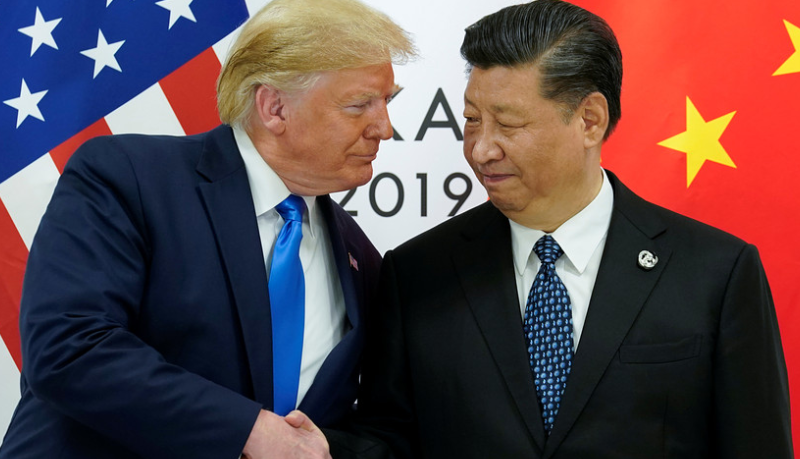Stocks jump in Japan, mainland China
Asian markets gained in early trading Monday, after the U.S. and China over the weekend agreed to a timeout in their tariff war and agreed to resume trade negotiations.
After meeting with China’s President Xi Jinping on Saturday at the G-20 summit in Japan, President Donald Trump said that current tariffs would remain in place, but new ones would be placed on hold for the “time being.” Trump said his talks went “even better than expected” and that “we’re going to work with China where we left off.” Despite his optimism, the U.S. and China remain entrenched in their positions, and it is unclear how long it may take to reach a final agreement. The two sides haven’t met for formal negotiations since talks broke off in early May.
Japan’s Nikkei NIK, +1.87% rose 1.8%. The Shanghai Composite SHCOMP, +1.88% gained 2.1% and the smaller-cap Shenzhen Composite 399106, +2.93% surged 2.9%. South Korea’s Kospi 180721, -0.07% was about flat, while benchmark indexes in Taiwan Y9999, +1.65% , Singapore STI, +1.30% and Indonesia JAKIDX, +0.29% advanced. Australia’s S&P/ASX 200 XJO, +0.42% gained 0.5%. Hong Kong’s market was closed for a holiday.
“After spending the better part of two months in trade war purgatory and with G-20 done and dusted, risk markets have responded to Saturday’s events in a reveller tone,” Stephen Innes, managing partner at Vanguard Markets, said in a note Monday. “Indeed, investors heaved a massive, but exhausted, sigh of relief.”
“The biggest question on everyone’s mind is will any armistice stick or will history repeat, and trade war gridlock set in?” he added.
Among individual stocks, Japan Steel 5631, +6.06% surged in Tokyo trading. Sony 6758, +1.74% and robotics maker Fanuc 6954, +2.78% also rose, while Rakuten 4755, -3.44% slid. Samsung 005930, -1.06% and LG Electronics 066570, -3.53% declined in South Korea. Foxconn 2354, +1.43% and Taiwan Semiconductor 2330, +4.39% gained in Taiwan, and Oil Search OSH, +1.56% advanced in Australia.
Wall Street ended last week on an upbeat note after the Federal Reserve raised expectations that it is prepared to cut interest rates if needed to keep the economy growing.
The S&P 500 index SPX, +0.58% rose 0.6% to 2,941.76. The index ended the month with a 6.9% gain. The Dow Jones Industrial Average DJIA, +0.28% gained 0.3% to 26,599.96. The Nasdaq composite COMP, +0.48% rose 0.5% to 8,006.24.
Despite the positive news on the trade front, the latest data were less upbeat.
A closely watched survey by Japan’s central bank, released Monday, showed confidence among major manufacturers in the economy worsened for the second straight quarter.
The Bank of Japan’s quarterly “tankan” survey of major companies showed confidence deteriorated in June compared with March, with the main index for major manufacturers fell to 7 in June from 12 in the previous quarterly survey in March.
Meanwhile, another indicator, the purchasing managers’ index (PMI) for China’s manufacturing sector, remained stable but still in contractionary territory at 49.4 in June, even with May’s reading, the National Bureau of Statistics reported.
Readings above 50 indicate expansion, while a reading below 50 reflects contraction.
Benchmark crude oil CLQ19, +2.22% rose $1.21 to $59.62 a barrel in electronic trading on the New York Mercantile Exchange. It fell 96 cents to $58.47 a barrel on Friday. Brent crude BRNQ19, -0.06% , the international standard, rose $1.34 to $66.08 a barrel.
The dollar USDJPY, +0.34% rose to 108.24 Japanese yen from 107.87 yen on Friday.

